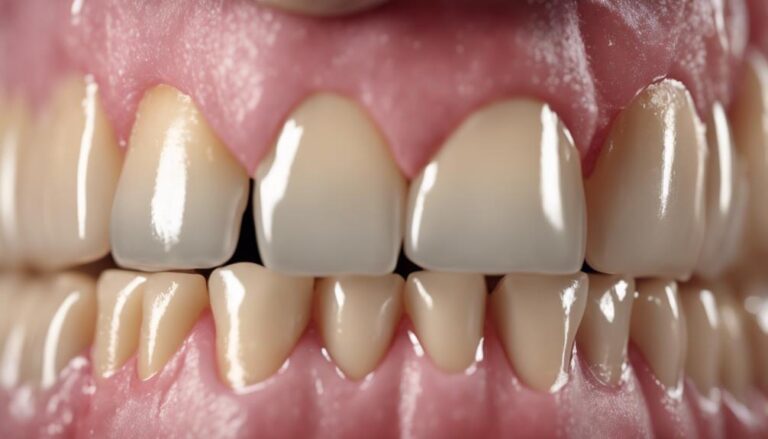To prevent bad breath and gum disease, maintain proper oral hygiene. Brush teeth twice daily with fluoride toothpaste, floss daily, and use an antiseptic mouthwash. Adopt a 45-degree angle for gentle brushing and floss in a C shape below the gumline. Stay hydrated, chew sugar-free gum, and limit sugary foods. Proper toothbrush care and regular dental check-ups are essential. More tips await to enhance your oral health regimen.
Key Takeaways
- Brush teeth twice daily with fluoride toothpaste and floss to prevent gum disease and bad breath.
- Use an antiseptic mouthwash daily to reduce bacteria and freshen breath.
- Stay hydrated, avoid sugary foods, and limit smoking to maintain oral health.
- Regular dental check-ups for early detection and professional cleaning are crucial.
- Proper oral hygiene techniques like gentle brushing and correct flossing help prevent bad breath.
Understanding the Link Between Bad Breath and Gum Disease
Understanding the connection between bad breath and gum disease is essential for maintaining excellent oral health. Bad breath causes can often be linked to underlying issues such as gum disease. Gum disease symptoms, such as swollen or bleeding gums, can contribute to the development of bad breath. This occurs due to the buildup of bacteria in the mouth, which can lead to both gum disease and malodorous breath.
When gum disease is present, the gums become inflamed and may start to pull away from the teeth, forming pockets where bacteria can thrive. These bacteria release volatile sulfur compounds, resulting in the unpleasant odor associated with bad breath. Addressing gum disease is important not only for oral health but also for combating bad breath at its source.
Regular dental check-ups, proper oral hygiene practices, and a balanced diet can help prevent gum disease and subsequently reduce the likelihood of experiencing chronic bad breath. By understanding this link, individuals can take proactive steps to maintain fresh breath and healthy gums.
Importance of Oral Hygiene for Prevention
Maintaining proper oral hygiene is essential in preventing gum disease and bad breath. By adhering to proper techniques and consistent habits, you can greatly reduce the risk of developing these oral health issues.
Proper techniques involve brushing your teeth at least twice a day with fluoride toothpaste, flossing daily to remove plaque and food particles between teeth, and using an antiseptic mouthwash to kill bacteria. Consistent habits, such as visiting your dentist for regular check-ups and cleanings, are vital in detecting and addressing any oral health concerns early on.
Neglecting oral hygiene can lead to a buildup of plaque, which can irritate the gums, causing inflammation and potential gum disease. Additionally, poor oral hygiene can result in persistent bad breath, known as halitosis. By prioritizing oral hygiene and incorporating proper techniques into your daily routine, you can maintain a healthy mouth and prevent the onset of gum disease and bad breath.
Brushing Techniques for Fresh Breath
What brushing techniques can help you achieve fresh breath and maintain peak oral hygiene? Proper brushing technique is essential for both fresh breath and overall oral health. To start, use a soft-bristled brush and fluoride toothpaste. Hold the brush at a 45-degree angle to your gums and move it back and forth in short, gentle strokes. Make sure to brush all surfaces of your teeth, including the inner, outer, and chewing surfaces. Don’t forget to brush your tongue as well, as bacteria can accumulate there and contribute to bad breath.
Timing is also important. Brush your teeth for at least two minutes, twice a day. Some find it helpful to divide the mouth into quadrants and spend 30 seconds on each. This guarantees thorough cleaning of the entire mouth. Additionally, replace your toothbrush every three to four months or sooner if the bristles are frayed.
The Role of Flossing in Gum Health
How does flossing play an important role in maintaining healthy gums and overall oral hygiene? Flossing is an integral aspect of a thorough oral care routine. Here are key points to ponder:
- Flossing frequency: Regular flossing, ideally once a day, helps remove food particles and plaque from between the teeth where the toothbrush can’t reach.
- Proper technique: Correct flossing technique involves gently sliding the floss between each tooth in a C shape to clean below the gumline without causing damage.
- Prevention of gum disease: Flossing helps prevent gum disease by reducing plaque buildup and inflammation in the gum tissues.
- Fresh breath: By removing trapped food particles and bacteria, flossing contributes to fresher breath and a cleaner mouth.
- Overall health: Maintaining healthy gums through flossing is linked to lower risks of systemic conditions like heart disease and diabetes.
Incorporating flossing into your daily routine is an effective way to promote gum health and maintain good oral hygiene.
Mouthwash and Its Impact on Oral Health
Using mouthwash regularly can greatly impact oral health by targeting bacteria and freshening breath. Mouthwash benefits include reducing plaque, fighting gum disease, and providing a invigorating sensation. However, there are some drawbacks to keep in mind, such as the potential for alcohol-based mouthwashes to cause dry mouth or irritation for some individuals.
When choosing the right mouthwash, it’s important to look for products that are alcohol-free if sensitivity is a concern. Additionally, selecting a mouthwash that contains fluoride can help strengthen tooth enamel and prevent cavities. Some mouthwashes are specifically designed to address certain issues like gum disease or sensitive teeth, so reading labels carefully is necessary. Overall, incorporating mouthwash into your oral hygiene routine can complement brushing and flossing efforts, promoting overall oral health.
| Benefits | Drawbacks | Choosing the Right Mouthwash |
|---|---|---|
| Reduces plaque | Alcohol-based may cause dry mouth or irritation | Look for alcohol-free options if sensitive |
| Fights gum disease | Choose fluoride-containing mouthwashes | |
| Invigorates breath | Select products tailored to specific needs |
Healthy Diet Choices for Strong Gums
Ensuring a diet rich in nutrients can play a pivotal role in maintaining strong gums and overall oral health. Making wise nutritional choices is essential for gum health and overall oral wellness. Here are five dietary habits to help you strengthen your gums:
- Vitamin C-Rich Foods: Citrus fruits, bell peppers, and strawberries are excellent sources of vitamin C, which can help prevent gum inflammation and promote gum tissue health.
- Leafy Greens: Incorporating greens like spinach and kale into your meals provides essential vitamins and minerals that support gum strength and overall oral health.
- Omega-3 Fatty Acids: Foods like salmon, chia seeds, and walnuts are rich in omega-3s, which have anti-inflammatory properties beneficial for gum health.
- Dairy Products: Calcium-rich dairy products such as milk, yogurt, and cheese can help strengthen teeth and gums.
- Green Tea: Drinking green tea can reduce inflammation in the mouth and promote healthy gums due to its antioxidants and polyphenols.
Regular Dental Check-ups for Prevention
Regular dental check-ups are essential for preventing oral health issues and maintaining peak oral hygiene. These routine visits play a vital role in preventive care by allowing dentists to detect any potential problems early on and take necessary actions.
During these check-ups, dental cleanings are performed to remove plaque and tartar buildup that regular brushing and flossing might miss. This thorough cleaning helps prevent gum disease and cavities, ensuring your mouth stays healthy.
In addition to cleaning, regular dental check-ups involve a thorough examination of your oral cavity. Dentists will assess your teeth, gums, and overall oral health, looking for any signs of decay, gum disease, or other issues. By identifying problems in their early stages, interventions can be made promptly, preventing them from escalating into more severe conditions.
Therefore, scheduling regular dental check-ups isn’t only beneficial for maintaining a bright and healthy smile but also for safeguarding your overall well-being. Make sure to prioritize these appointments to stay on top of your oral health and address any concerns promptly.
Managing Dry Mouth to Prevent Bad Breath
To effectively prevent bad breath, managing dry mouth is essential for maintaining ideal oral hygiene. Dry mouth, also known as xerostomia, occurs when there’s a decreased flow of saliva in the mouth. This condition can lead to an increase in bacteria, causing bad breath and potentially leading to gum disease if left untreated.
Here are some key strategies to manage dry mouth effectively:
- Stay Hydrated: Drinking plenty of water throughout the day helps stimulate saliva production and keeps the mouth moist.
- Chew Sugar-Free Gum: Chewing gum can help stimulate saliva flow and alleviate dry mouth symptoms.
- Use Saliva Substitutes: Over-the-counter saliva substitutes can provide relief by moistening the mouth.
- Avoid Caffeine and Alcohol: These substances can contribute to dehydration, worsening dry mouth symptoms.
- Humidify the Air: Using a humidifier in your room can help keep the air moist, reducing oral dryness.
Incorporating these hydration techniques and promoting saliva production play an essential role in managing dry mouth and preventing bad breath.
Stress Reduction Techniques for Oral Health
Implementing stress reduction techniques is crucial for maintaining peak oral health and overall well-being. Stress can have a significant impact on oral health, leading to conditions such as gum disease and bad breath.
To combat the negative effects of stress on oral health, incorporating meditation techniques and relaxation methods into your daily routine can be highly beneficial.
Meditation techniques, such as mindfulness practices, can help reduce stress levels and promote a sense of calmness and relaxation. By engaging in stress management activities like deep breathing exercises or progressive muscle relaxation, individuals can lower their stress levels and improve their overall well-being, which in turn can positively impact oral health.
Incorporating stress reduction techniques not only benefits your mental and emotional health but can also contribute to a healthier mouth. By prioritizing stress reduction through mindfulness practices and relaxation methods, you can work towards maintaining excellent oral health and preventing conditions like gum disease and bad breath.
Impact of Smoking on Gum Disease
Stress reduction techniques play an important role in oral health, and this connection extends to the impact of smoking on gum disease. The relationship between tobacco use and oral health is well-documented, with smoking being a major risk factor for periodontal disease. Here are five key points highlighting the impact of smoking on gum disease:
- Increased Risk: Smoking increases the likelihood of developing gum disease due to its harmful effects on the immune system.
- Delayed Healing: Smokers experience slower healing following dental procedures, which can worsen gum disease progression.
- Reduced Blood Flow: Tobacco restricts blood flow to the gums, hindering the body’s ability to fight off infections.
- Bone Loss: Smoking contributes to bone loss in the jaw, leading to tooth mobility and potential tooth loss.
- Importance of Smoking Cessation: Quitting smoking is essential for preventing and managing periodontal disease, as it can greatly improve gum health.
Understanding the oral health relationship with smoking is crucial in promoting periodontal disease prevention and overall well-being.
Limiting Sugary Foods for Better Breath
Reducing sugary foods is essential for maintaining fresh breath and overall oral health. Sugars feed the bacteria in your mouth, leading to plaque buildup, which can result in bad breath and contribute to gum disease. To combat this, consider sugar substitutes like xylitol, which not only sweeten foods but also inhibit the growth of bacteria that cause cavities. Opting for sugar-free gum or mints with xylitol can also help freshen your breath while protecting your dental health.
Hydration plays a key role in breath freshness. Drinking an adequate amount of water throughout the day helps wash away food particles and bacteria that can lead to bad breath. Additionally, staying hydrated promotes saliva production, which is essential for maintaining a healthy mouth environment.
Drinking Sufficient Water for Oral Hygiene
To maintain excellent oral hygiene, ensuring sufficient hydration by drinking enough water is essential. Hydration benefits extend beyond just quenching thirst; it plays an important role in maintaining a healthy mouth. Here are five key reasons why water intake is crucial for oral hygiene:
- Flushes Away Food Particles: Drinking water helps wash away food debris that can lead to plaque buildup and bad breath.
- Promotes Saliva Production: Staying hydrated stimulates saliva production, which is necessary for neutralizing acids and protecting teeth.
- Prevents Dry Mouth: Adequate water intake prevents dry mouth, a condition that can promote bacterial growth and lead to bad breath.
- Maintains Gum Health: Hydration supports proper blood circulation, which is essential for gum health and overall oral hygiene.
- Aids in Digestion: Proper hydration aids in digestion, preventing stomach-related issues that can affect oral health.
Toothbrush Care for Effective Cleaning
Proper maintenance of your toothbrush is essential for ensuring effective cleaning and ideal oral hygiene. Toothbrush sanitation is vital in preventing the growth of harmful bacteria that can lead to bad breath and gum disease. To keep your toothbrush clean, rinse it thoroughly with water after each use, shake off excess water, and store it in an upright position to air dry. Avoid covering your toothbrush as a damp environment can promote bacterial growth.
In addition to sanitation, brushing frequency is also key to maintaining a healthy mouth. Dentists recommend brushing your teeth at least twice a day for two minutes each time. This routine helps remove plaque buildup, prevent cavities, and keep your breath fresh. Remember to replace your toothbrush every three to four months or sooner if the bristles appear frayed.
Natural Remedies for Fresher Breath
Exploring natural remedies can be a beneficial approach to combatting bad breath and promoting fresher breath throughout the day. When it comes to maintaining peak oral hygiene, incorporating herbal remedies and oil pulling into your routine can be effective. Here are some natural remedies to help freshen your breath:
- Herbal remedies: Herbs like mint, parsley, and cloves have natural breath-freshening properties that can help combat bad breath.
- Oil pulling: This ancient practice involves swishing oil around in your mouth to remove bacteria and promote fresher breath.
- Green tea: Drinking green tea can help reduce the sulfur compounds in your mouth that contribute to bad breath.
- Probiotic foods: Foods like yogurt and kefir can help balance the bacteria in your mouth, reducing bad breath.
- Water: Staying hydrated is essential for fresh breath as it helps wash away food particles and bacteria that can cause odor.
Incorporating these natural remedies into your daily oral care routine can contribute to fresher breath and overall improved oral health.
Creating a Routine for Long-term Prevention
Establishing a consistent oral care regimen is key to long-term prevention of bad breath and gum disease. A nighttime routine is essential for maintaining oral health. Begin by thoroughly brushing your teeth for two minutes with a fluoride toothpaste. Make sure to also clean your tongue to remove bacteria that can cause bad breath. Flossing shouldn’t be skipped, as it helps remove plaque and food particles from between the teeth where your toothbrush can’t reach.
Incorporating preventive care is vital. Consider using an antiseptic mouthwash to kill bacteria and freshen your breath. Additionally, using a water flosser can be beneficial in removing debris and reducing the risk of gum disease. Don’t forget to schedule regular dental check-ups to catch any issues early on.
Frequently Asked Questions
Can Genetics Play a Role in Bad Breath and Gum Disease?
Genetic predisposition may influence bad breath and gum disease, but lifestyle factors also play a significant role. While genetics can contribute, maintaining good oral hygiene through regular brushing, flossing, and dental check-ups can help prevent issues.
Is There a Correlation Between Hormonal Changes and Oral Health?
Yes, there’s a correlation between hormonal changes and oral health. Pregnancy hormones can affect gums, increasing risk of gum disease. Menopause can also impact oral health, potentially leading to gum disease due to hormonal shifts.
Can Certain Medications Contribute to Bad Breath and Gum Issues?
Certain medications can indeed contribute to bad breath and gum issues due to side effects. It’s important to maintain good oral hygiene habits to counteract these effects. Regular brushing, flossing, and dental check-ups are essential.
How Does Aging Affect the Likelihood of Developing Gum Disease?
As I age, my risk for gum disease rises due to increased susceptibility. Diligent oral hygiene becomes vital to combat this. Regular brushing, flossing, and dental check-ups are essential to maintain healthy gums and prevent issues.
Are There Specific Dental Conditions That Can Worsen Bad Breath?
When it comes to specific dental conditions that can worsen bad breath, poor oral hygiene and an unhealthy diet are major culprits. Additionally, stress and smoking can exacerbate this issue, underscoring the importance of thorough oral care.
Conclusion
To sum up, maintaining good oral hygiene is essential for preventing bad breath and gum disease. By understanding the link between the two and following proper brushing, flossing, and mouthwash techniques, you can keep your mouth healthy and fresh.
Remember to drink enough water, take care of your toothbrush, and consider natural remedies for added benefits. Establishing a routine for long-term prevention will guarantee a healthy smile and confident breath. Stay proactive in your oral care to keep your mouth in top shape.






